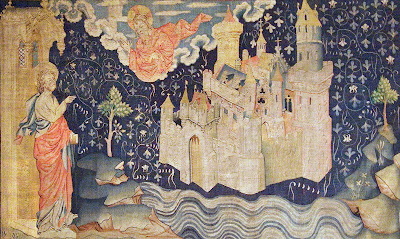A political-theological ghost story — a lesson to be learnt from the Russian invasion of the Ukraine
 |
| John of Patmos watches the descent of New Jerusalem from God in a 14th-century tapestry |
A short “thought for the day” offered to the Cambridge Unitarian Church as part of the Sunday Service of Mindful Meditation
(Click on this link to hear a recorded version of the following piece)
—o0o—
Those of you who know me well know I am very interested in ghosts — not because I believe them to be actual, existing entities, but because a critical, historical, sociological study of them can help reveal what powerful ideas, hopes and desires haunt any given culture.
As I have often noted over the twenty-two years I’ve been your minister, it seems to me that many of the ghosts which haunt us today are theological ones that we have mistakenly thought had been well and truly laid by the advances of secular, liberal thinking in all its forms. Notwithstanding his own hateful, Nazi politics, I think Carl Schmitt (1888-1985) was absolutely right when he wrote in 1922:
“All significant concepts of the modern theory of the state are secularized theological concepts not only because of their historical development . . . but also because of their systematic structure, the recognition of which is necessary for a sociological consideration of these concepts” (Political Theology: Four Chapters on Sovereignty, MIT Press, 1985, p. 36).
Now let me tell you about just such a Schmittian, political-theological ghost that I’m sure has helped prepare the ground for the terrible, truly shocking event that is the current Russian invasion of Ukraine.
The once-living theological concept that eventually became the secular ghost I’m concerned about today, is that there is a beginning and an end to human history, an alpha and omega to it all. In the Judaeo-Christian tradition this basic concept was expressed in something called “salvation history” (Heilsgeschichte), namely the story we have told ourselves which starts with our creation by God, runs through the lengthy and dark vale of tears that is human history, and which finally ends either in hell or the safe and eternally secure sunlit uplands of a heavenly New Jerusalem. The final, apocalyptic moment before our arrival in either hell or the city of God was understood to signal the end of history.
I do not want to rehearse with you here the story of how and why belief in this “salvation history” eventually withered and died in our modern culture, but I do want to point to the moment when its political-theological ghost first visibly rose from the grave and began its dark work as a spectre haunting all secular democracies across the world but, in particular, Europe and North America.
In 1989, responding to events that eventually led to the fall of the Berlin Wall, the American political “scientist,” Francis Fukuyama, wrote an essay for The National Interest (No.16, Summer 1989) called “The End of History?” that contains this famous and much-quoted sentence:
“What we may be witnessing is not just the end of the Cold War, or the passing of a particular period of postwar history, but the end of history as such: that is, the end point of mankind’s ideological evolution and the universalization of Western liberal democracy as the final form of human government.”
Many of us at the time thought this was an absurd and foolish thing to say but such was the confidence of many influential Western politicians, economists, bankers and industrialists that in its highly financialised, late-capitalist form, Western liberal democracy really was the new New Jerusalem, following Fukuyama they also confidently proclaimed the end of history. From then on the ghost of the end of history began daily to haunt our culture and, alas, its message has slowly permeated very deeply into all of us in a way that helps explain why so many people are expressing such surprise that the invasion of a democratic European country is something that can happen today.
This invasion is, without doubt, a deeply shocking, frightening and astonishing turn of events but is it really surprising? It should not be because history did not end in August 1989, Western liberal democracy has all too often singularly failed to maintain and strengthen its best aspects at the expense of promoting its worst [for an example of what I mean, please see this article by the former attorney general for England and Wales and former chair of the intelligence and security committee of parliament, Dominic Grieve QC], in no form was it ever universally applied around the world and, lastly, neither was it ever going to be the final form of human government.
And so here we are. History is still happening and Fukuyama’s words and the ghost it raised have been definitely shown to be wrong.
There’s not much I can say to you in the here and now that is obviously and immediately positive but I can say one important thing that might, just might, have a long-term positive influence upon all of us who still value the idea of Western liberal democracy.
There is a chance that this invasion will help us finally to lay the ghost of the idea that there exists an end of history. The kind of liberal democratic, cosmopolitan and earthly New Jerusalem for which we are still hoping and working is only something that can be made on a daily, local, one-to-one basis and the democratic gains we make, whenever they are made, are never assured forever. As St Benedict (480-548) wisely said in his famous rule: “Always we begin again.”
So, please, please, remember there is no end of history.


Comments